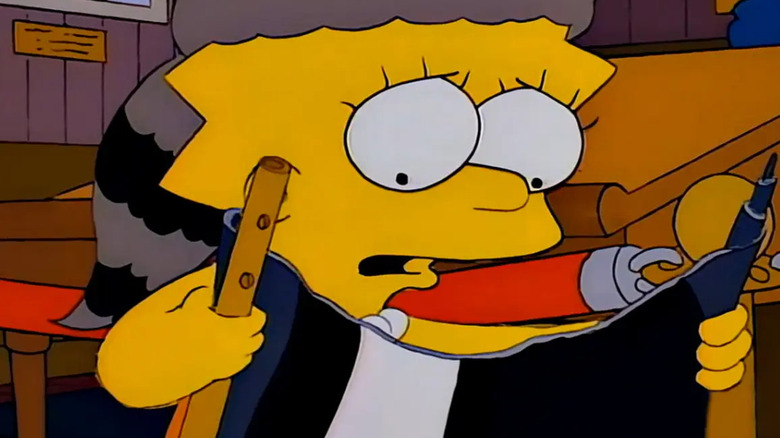Fox Censors Stepped In On Family Guy When Some Made-Up Profanity Became Real
In the "Family Guy" episode "Patriot Games" (January 29, 2006), Peter (Seth MacFarlane) is enlisted to play for the New England Patriots after he charges through a crowd of people on his way to the bathroom at a high school reunion. Peter, the shallow egotist that he is, is soon fired for showboating, but at least he got to meet Tom Brady (himself). The plot continues into a snobs-vs.-slobs story wherein Peter becomes the coach for a British football team called the London Sillinannies.
Like every episode of "Family Guy," "Patriot Games" contains many, many asides, pop culture references, and throw-away gags presented without any context whatsoever. Case in point: early in the episode, two characters are watching the news on TV, and the announcer, having finished speaking about the main story of the night, announces "Coming up: America's hottest new curse word. Clemen!" Or maybe it's "kleeman." There is no explanation as to what "kleeman" means, only that it has entered the lexicon of obscenities.
Mike Henry wrote "Patriot Games," and he couldn't have known that he was inventing an actual cuss word. As one might predict, the writers of "Family Guy" butted heads with censors a lot, and they often received notes as to what words they could and could not use on the air (evidently "vagina" was forbidden). It seems that "kleeman" was a word several writers used as an in-joke around the office when they wanted to use "vagina." Henry seems to have written "kleeman" into "Patriot Games" as an extension of that joke.
"Family Guy" writer Chris Sheridan spoke to CinemaBlend in 2020 and related a strange development. It seems that someone named Alex Pulido entered "kleeman" into Urban Dictionary as an actual cuss word ... and that it would have to be censored.
It smells like a kleeman in here. Open a window.
Sheridan succinctly summed up the origin of "kleeman," saying:
"['Family Guy'] has been on long enough that we did a bit once where we had the word 'vagina' in an episode. They said, 'You can't say vagina on the air.' So we changed the word and we just came up with our own word and called it 'cleman.' We just swapped out 'vagina' with 'cleman,' and it was like, 'Oh, we'll just say that. No problem.'"
And it wasn't a problem. Until it was. In a later episode, another writer wanted to make a callback to "kleeman," once again using it as a replacement word for "vagina." It sounds rude, of course — that's the point — but it was fair game, given that the "Family Guy" writers made it up. When Fox censors looked it up, however, they assumed "kleeman" was in popular usage. Sheridan continued:
"[S]everal years later, we did a joke, and we use the word 'kleeman,' and they're like, 'Well you can't say that.' And we're like, 'What do you mean we can't say it?' 'Well no, it means vagina.' I was like, 'I know! We made it up.' But it made its way into the Urban Dictionary, and then we couldn't say it. I was like, 'I think that's completely unfair.' So when a show is on that long, it's just insane."
It seems that the adoption of kleeman into the Urban Dictionary was something of a prank pulled by an attentive "Family Guy" fan. It's unlikely that anyone has used kleeman earnestly in reference to any part of human anatomy. Like "dirty Sanchez" or "donkey punch," it was adopted as a slang term specifically because it doesn't exist.
A perfectly cromulent word
These kinds of pranksterish neologisms do appear in the English lexicon from time to time. One might want to have a conversation with "The Simpsons" writer David X. Cohen and the episode "Lisa the Iconoclast" (February 18, 1996). In that episode, one character expresses befuddlement at the word "embiggen" appearing on Springfield's official iconography. A second character turns to the first and declares that it is "a perfectly cromulent word." It seems that "cromulent" was invented for that episode. It was a poetic word, however, and it soon became used in casual conversation. At last check, "cromulent" now appears in dictionaries.
"Cromulent" was less of an impish prank like "kleeman" was, however.
One might also recall the New York Times article from 1992 wherein the paper's reporters aimed to uncover the new slang used by Seattle's booming grunge scene. They talked to a supposed authority on the matter, a young overcaffeinated woman named Megan Jasper, who had her finger on the pulse. Unwilling to entertain the Times' reporter, Rock Marin — and certainly sick of the way outsider rock is co-opted by the mainstream — Jasper started inventing slang off the top of her head. "Lamestain," "cob nobbler," and "swingin' on the flippity-flop" were actually printed in the Times as grunge-related slang, thanks to Jasper's prank. Weirdly, one of her invented slang terms — "rock on" used to say goodbye — has been used organically in public. Jasper is currently the CEO of Sub Pop Records.
Meanwhile, the current state of "kleeman" as a censorable cuss word is unknown. What a kungle.


